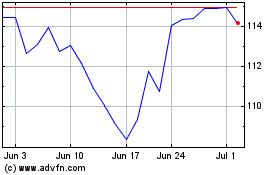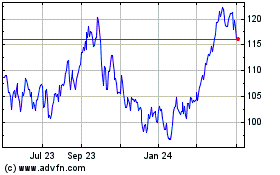By Timothy Puko and Bradley Olson
Exxon Mobil Corp., once a powerful skeptic of global warming,
will now be among the first oil companies to put money into the
fight to make climate change a political priority in
Washington.
The U.S.'s largest energy producer will commit $1 million over
two years to promote a national tax on carbon as a way to address
the environmental issue. The funding will back an initiative
designed to appeal to the Republicans who now control Washington,
and may open the door for Exxon's peers in the oil industry to
follow.
As warnings over the dangers of climate change have grown,
governments around the world have pursued increasingly stringent
regulation of fossil-fuel companies. Exxon's move is an attempt to
manage such pressure in the U.S. in ways it hopes will simplify
requirements on the oil industry, according to a person familiar
with the company's thinking.
Exxon sees a carbon tax as an alternative to patchwork
regulations, putting one cost on all carbon emitters nationwide and
eliminating regulatory uncertainty hovering over Exxon's business
in states that might seek to target oil companies, the person
said.
Exxon's contribution will go to Americans for Carbon Dividends,
a new group, one of whose co-chairmen is former Senate Majority
Leader Trent Lott. It is promoting a carbon tax-plus-dividend
policy first proposed by two former U.S. secretaries of state,
James Baker III and George Shultz, last year. All three men are
Republicans.
The initiative's goal is to discourage companies from emitting
carbon through the tax, while minimizing additional cost to
consumers. Funds raised by the tax would be channeled to Americans
through what the group calls a "carbon dividend" that it estimates
could be as much as $2,000 annually per family. Monthly payments
would go directly to the recipients. The tax would be
"revenue-neutral," having no net effect on government receipts.
Exxon's move places it among global corporations that are
promoting policies and business strategies to fight climate change.
That list includes Apple Inc., Nike Inc. and McDonald's Corp., all
of which have pledged to embrace renewable power and eliminate
greenhouse gas emissions.
General Motors Co. , Johnson & Johnson , and other oil
companies, including BP PLC, are founding members of the Climate
Leadership Council, the organization fine-tuning the Baker-Shultz
plan. "This is a real turning point in U.S. climate policy and
politics," the council's leader, Ted Halstead, said of Exxon's
commitment. "Corporations are leading us to a solution."
Exxon's decision to lobby for a carbon tax represents a
remarkable shift from the company's stance roughly two decades ago.
At the time, Exxon was at the center of industry efforts
questioning the validity of global-warming claims and policy
proposals -- tactics that critics say contributed to the political
polarization that has impeded legislative consensus on the issue to
this day.
As early as 1997, Exxon took out newspaper advertisements,
titled "Unsettled Science," that asserted "scientists remain unable
to confirm" whether humans are causing "global warming." That same
year, in a speech just months before a multination agreement to
reduce emissions was reached in Kyoto, Japan, Lee Raymond, then
Exxon's CEO, said proposals to cut emissions "are neither prudent
nor practical."
In the ensuing years, Exxon and a number of its peers spent tens
of millions of dollars supporting such bodies as the Global Climate
Coalition, the American Petroleum Institute and the American
Legislative Exchange Council, all of which highlighted scientific
uncertainty about rising global temperatures. As it did, Exxon also
supported climate research, including a $100 million contribution
to Stanford University to promote climate science and emissions
reduction.
By all accounts, the company's stance softened after Rex
Tillerson took over from Mr. Raymond in 2006. Exxon executives
began affirming climate change in public statements, saying the
problem "warrants action." The company also began supporting the
idea of a "revenue-neutral carbon tax."
That change coincided with investor pressure to disclose the
impact of climate regulations on its business -- and accusations
from environmental advocates that while Exxon recognized the
dangers of rising temperatures, it ignored the issue or even sowed
doubt on the science.
Exxon's support for a carbon tax stems in part from a desire to
alleviate some of these pressures. The proposal Exxon is promoting
would include legal provisions to shield companies from liability
for any connection between historical emissions and the effects of
climate change, though not for fraud.
Exxon has pushed back on the accusation that it sowed doubt on
climate change, emphasizing its contribution to more than 100
peer-reviewed research papers on the issue. A number of the
lawsuits have been dismissed in federal court, and while the New
York and Massachusetts investigations continue, the U.S. Securities
and Exchange Commission recently dropped an inquiry into how the
company accounts for the impact of climate change on its business
and values its oil and gas assets
Its support for a carbon tax puts Exxon in rare opposition to
allies in the Republican Party, at a time the GOP holds the White
House and majorities in Congress. Republican leaders there have
often derided the idea of global warming and disdained taxes as a
solution.
Many Republicans influential in the Trump era believe a carbon
tax of any kind would likely add to consumers' costs and thus view
the proposition as simply too unpopular with voters. One
Republican, Rep. Carlos Curbelo of Florida, proposed a carbon tax
bill earlier this year. But while the Baker-Shultz plan is designed
to be revenue-neutral by channeling all of the tax receipts
directly to Americans, critics say it is too complicated to gain
much traction politically.
"Not only are you asking the base to support climate policy, but
you're asking them to support a tax. You're asking them to support
a double whammy," said George David Banks, a former adviser to Mr.
Trump on climate issues.
Exxon's push to make environmentalism part of its brand has
accelerated. This year it pledged to cut its methane emissions 15%
by 2020 and has touted its research to make fuels from algae. Also,
its chief executive, Darren Woods, met with Pope Francis at the
Vatican in June to affirm that the company wants to be "part of the
solution" on climate change.
Last month Exxon joined Chevron Corp. and Occidental Petroleum
to commit $100 million each to the Oil and Gas Climate Initiative's
investment arm. The organization supports developing and using new
technology to lower carbon emissions.
Exxon's promotion of a carbon tax marks "an interesting and
important signal shift," said Sen. Sheldon Whitehouse (D., R.I.).
"For years, Exxon's political effort was all on the side of climate
denial and obstruction," he said. "At least Exxon money is now on
both sides of the fight."
Write to Timothy Puko at tim.puko@wsj.com and Bradley Olson at
Bradley.Olson@wsj.com
(END) Dow Jones Newswires
October 09, 2018 19:38 ET (23:38 GMT)
Copyright (c) 2018 Dow Jones & Company, Inc.
Exxon Mobil (NYSE:XOM)
Historical Stock Chart
From Mar 2024 to Apr 2024

Exxon Mobil (NYSE:XOM)
Historical Stock Chart
From Apr 2023 to Apr 2024
